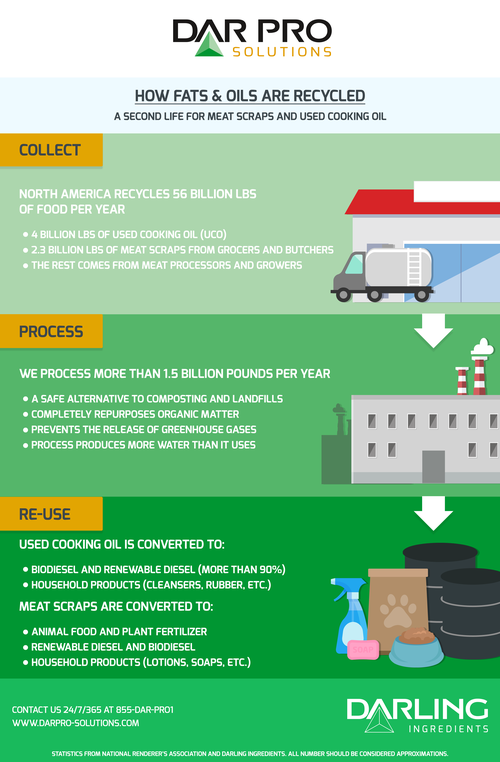North America loves meat and fried foods. Unfortunately, preparing these delicious foods generates a lot of waste. The most visible form is plate waste—but some 'leftovers' aren't quite as obvious. In a typical western diet, only 50% of the cow, chicken or pig is consumed. The remaining is deemed inedible for human diets.
But food "waste" doesn't have to be wasted! Meat fats and used cooking oil can be recycled.
What Waste Products Can Be Recycled?
Plant waste can go to compost, either on a small or large commercial scale. But animal products, oil, and grease, need to be treated differently. Luckily, like compost, they can be converted into other, useful products.
Animal and Meat By-Products
Humans eat meat, use leather for textiles, and select a few other parts of animals for special purposes. But what about the rest of it?
Every part of an animal can be used in animal byproduct recycling. Meat waste from industrial food production or butchering can include fat and bone, and inedible organs.
According to Ag Daily, recycling animal byproducts reduces over 50 billion pounds of raw animal waste in landfills each year.
Used Cooking Oil
Cooking oil can be reused—but only up to a point. Eventually, it will become dirty and too contaminated with food debris to be used safely for cooking. And unfortunately, it’s not something you can just dump down the drain when it’s time to dispose of it.
Used cooking oil can be processed or rendered, and most often repurposed as ingredients for other products. All types of commercial cooking oil can be recycled, including vegetable oil, peanut oil, and canola oil.
Related Article: How to Responsibly Dispose of Used Cooking Oil
What Can Be Made From Recycled Animal Byproducts?
The wonderful and interesting thing about recycling these organic materials is that they transform into something new. The products that recycling animal products creates are more common than most people think.
Edible
Edible products are monitored by the USDA and Food Safety and Inspection Services (FSIS).
The most famous edible material created from rendering is gelatin. It’s a binding ingredient in a lot of desserts and candy. Other common products include tallow and lard, which are created from animal fat and used instead of cooking oil in a lot of recipes.
Inedible
A product is generally considered “edible” if it is “fit for human consumption.” And, in western culture, only about 50% of an animal makes it to the dinner plate. Inedible items, however, can be processed to create products fit for animal feed and pet food.
Inedible products can also be used as plant food. Many organic fertilizers include bone or feather meal that are created at rendering plants, including those from our sister company, Nature Safe Fertilizers.
Other inedible products made from animal byproducts include soap, adhesives, some beauty products and ingredients for cleaner-burning biofuels, such as renewable diesel.
What Can Be Made From Recycled Used Cooking Oil?
Recycled used cooking oil also finds its way into a lot of soaps and beauty products. Additionally, it can be used in pet food, or even as an effective lamp oil and industrial lubricant.
You can read a full list of how used cooking oil can be recycled here, but our largest venture is creating renewable diesel.
Biofuel and Renewable Diesel
The primary use for recycled used cooking oil is in creating biofuels. Repurposing cooking oil that would otherwise be discarded into biofuel is effective both economically and environmentally.
Used cooking oil is a key ingredient for the production of renewable diesel. A cleaner-burning biofuel, it can reduce GHG emissions by up to 80% compared to fossil fuels.
A joint venture between our parent company, Darling Ingredients, and Valero Energy Corporation, North America’s largest refinery, Diamond Green Diesel, has the capacity to convert waste fats and oils into 1.2 billion gallons of renewable biofuel annually.
Related Article: Sustainable Biofuel and Renewable Diesel Production
The Upcycling Process with DAR PRO
So how exactly do we transform meat scraps and used cooking oil into these valuable ingredients?

Step 1. Collect
Darling Ingredients processes 15% of the world's slaughtered animals and 60% of the used cooking oil in the U.S.
According to the North American Renderers Association, approximately 56 billion pounds of inedible meat by-products and used cooking oil is recycled in North America each year. Of this total, 2.3 billion pounds of fat, meat, and bone come from retail butchers and supermarkets. 4 billion pounds of used cooking oil are collected from restaurants and foodservice establishments, and the remaining 49.7 billion pounds are from growers and meat processing plants.
To learn more about the collection process with DAR PRO, read our Complete Guide to Used Cooking Oil Service.
Step 2. Process
The term for recycling animal products is called rendering. The primary purpose of the rendering process is to create sustainable ingredients that can be used in a variety of products.
The Environmental Protection Agency describes several ways to render animal products for different purposes. Each process separates the animal fat and other components through extreme heat and several filtering steps to make them safe and sanitary for whatever they may be used for.
Aside from upcycling valuable organic material, the rendering process also has some positive effects on the environment.
Step 3. Reuse
We reuse most of the material we collect from our customers. Through our joint venture with Diamond Green Diesel (DGD), we take the animal fats and used cooking oils and turn them into an ingredient crucial to the creation of renewable diesel. DGD has the capacity to produce billions of gallons of renewable diesel annually.
Darling Ingredients’ edible divisions (Rousselot, Peptan, and Sonac, located primarily in Europe, Asia and South America) operate in independent, state-of-the-art, food-grade facilities dedicated to producing gelatin, collagen peptides, hemoglobin, and bone ash. These ingredients have a wide variety of uses in the food, pharmaceutical, and health industries worldwide.
Benefits of Recycling Animal Fats and Used Cooking Oil
Rendering animal fats and proteins and recycling used cooking oil can make immeasurable strides in environmental protection.
The USDA lists several reasons to recycle organic waste:
● Prevent the spread of disease
● Prevent organic waste from leaching into water sources
● Remove contaminated products from human and animal food supply
Additionally, when compared with petroleum diesel, biofuels reduce carbon emissions by up to 80%.
This is not even to mention preventing the continued overuse of landfills. Not only are we running out of space in landfills, but organic matter in landfills releases harmful greenhouse gases and encourages the growth of toxic pathogens. The rendering process virtually eliminates these dangers by repurposing the carbon and other bio-matter.

As a matter of fact, rendering is so effective that the EPA estimates that each year, rendering plants in North America reduce the same amount of carbon emissions that approximately 12 million cars produce.
In addition, our rendering plants are net water producers. After dehydrating the raw materials and removing contaminants, the excess water can be transferred to local water treatment facilities for further filtration. Our operations produce more water than they use. According to the North American Renderers Association, rendering animal byproducts sequesters five times more greenhouse gasses than it emits.
Related Article: The Environmental Benefits of Recycling Used Cooking Oil
Be Part Of The Solution
Recycling your used cooking oil and animal byproducts makes sense for both the environment and your bottom line. These materials have to go somewhere, so why not repurpose them?
DAR PRO Solutions, a brand of Darling Ingredients, is driven by sustainability. We’ve developed innovative solutions for commercial kitchens that include used cooking oil recycling and provide supermarket chains across the U.S. with eco-friendly, responsible meat byproduct collection.
Give us a call today at 1-833-731-1451 to discuss how we can help your business run as efficiently as possible.
DAR PRO Solutions is a thought leader in the industry for used cooking oil collection, grease trap services, and animal by-product collection. Our innovative equipment solutions, strong customer support, and service expertise will make handling grease a worry free part of your business. Reach out to a DAR PRO representative today and find out how your ghost kitchen or restaurant can benefit from our partnership. Call us 24/7/365 at 855-DAR-PRO1 (855) 327-7761.
Contact Sales
For customer service inquiries call our toll free number (855) 327-7761
By submitting this form I agree to the privacy policy including the usage of contact details to contact me for marketing purposes.
04/19/2018
